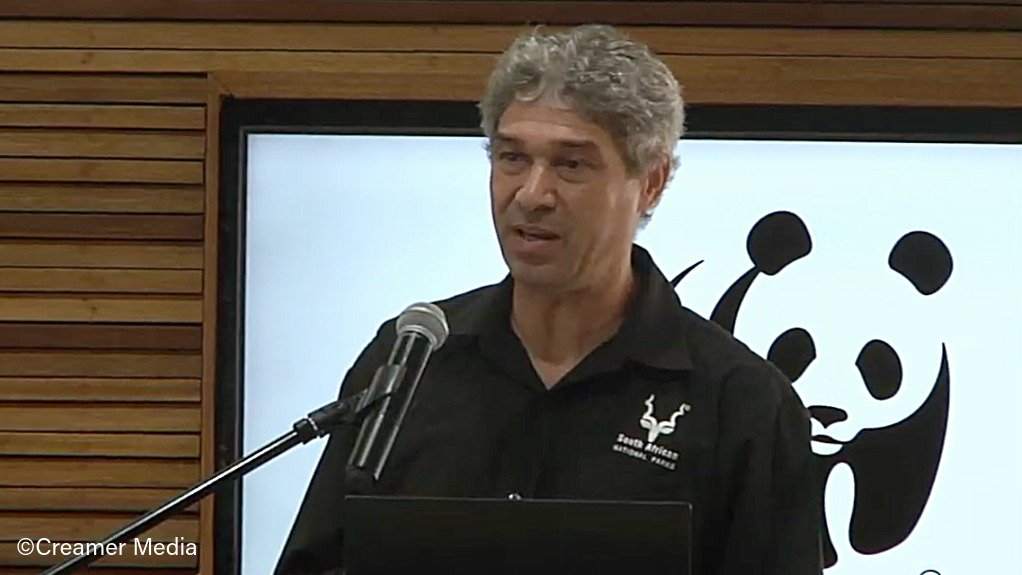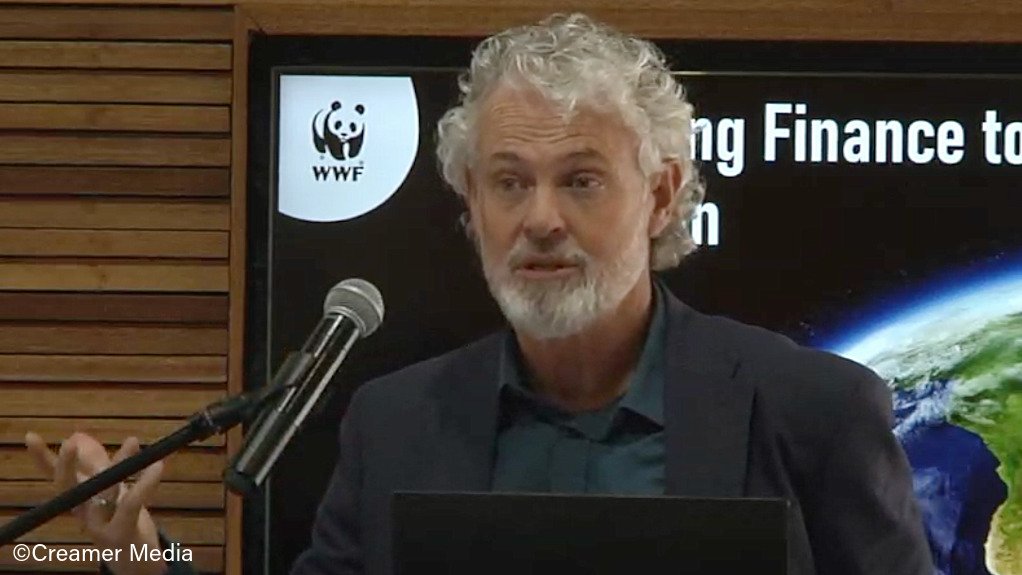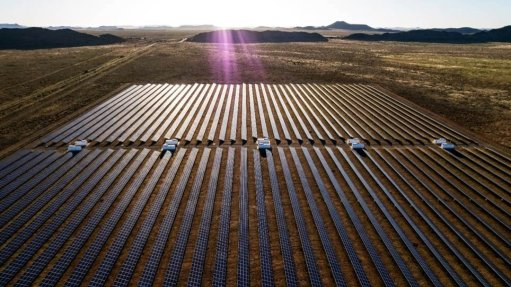WWF data shows significant decline in monitored wildlife populations



WWF South Africa CEO Dr Morné du Plessis, SANParks managing executive: conservation Dr Howard Hendricks and WWF South Africa programme head Dr Deon Nel discuss findings from the ‘Living Planet Report,’ and plans for Vision 2040
SANParks managing executive: conservation Dr Howard Hendricks
WWF South Africa programme head Dr Deon Nel
The average size of monitored wildlife populations has declined by 73% in the 50 years from 1970 to 2020, global conservation organisation the World Wide Fund for Nature’s (WWF’s) latest Living Planet Index (LPI) shows.
The fifteenth edition of the WWF’s biennial flagship publication, the ‘Living Planet Report’, shows that the world is approaching dangerous, irreversible planetary tipping points driven by the twin threats of nature loss and climate change, the organisation said.
The latest LPI indicates that the strongest decline has been in freshwater ecosystems at 85%, followed by a terrestrial decline of 69%, and then marine at 56%.
In Africa, the average decline in monitored wildlife populations stands at 76%.
Additionally, the report highlights that habitat loss and degradation, driven primarily by the global food system, is the most reported threat to wildlife populations around the world, followed by overexploitation, invasive species and disease.
The report also notes that climate change is a particular additional threat for wildlife populations in parts of the world.
The report states that reversing current trends will require radically scaling up effective and inclusive conservation action on the ground, as well as addressing the drivers of climate change and nature loss, such as transforming energy, food and finance systems.
WWF South Africa CEO Dr Morné du Plessis pointed out at the publication’s launch in South Africa that global food systems contribute to over 27% of global greenhouse-gas emissions, drawing more than 70% of freshwater globally.
He noted that most species at risk of extinction are threatened by the food system.
He also highlighted the issue of food security in South Africa, noting that one in five people go to bed hungry at least once a week, while one-third of the food produced goes to waste.
He argued for the scale-up of nature-positive production practices, such as regenerative and conservation farming, to mitigate these challenges.
“It’s a far more clever way of producing food in partnership with nature, not extracting from it,” he said, while also calling for the removal of environmentally harmful subsidies for agricultural practices.
VISION 2040
In 2022, South Africa, alongside 195 other countries, committed to a global plan to reverse the loss of nature by 2030 as part of the Global Biodiversity Framework (GBF).
To achieve the goals of the GBF, the WWF said countries were expected to act on a scale hitherto unseen and in new ways.
A pertinent example of the level of ambition that is required, is South African conservation authority SANParks’ Vision 2040, which reimagines the future of conservation on a much greater scale and in a more inclusive manner through the concept of mega living landscapes.
These are large, interconnected areas of land that encompass protected areas, private and communal land and a variety of compatible land uses.
“We need more momentum and more of this approach if we are to succeed in halting further biodiversity loss. Such approaches are not only more inclusive of society, but are also much more cost-effective to manage, enabling conservation efforts to be scaled to new levels,” the WWF said in a media release.
Speaking at the report launch, SANParks managing executive: conservation Dr Howard Hendricks noted that Vision 2040 sought to shift away from traditional fortress conservation to a more inclusive approach called convivial conservation.
“It's about living in harmony with nature, where people and nature [are] able to thrive. So, it is a collective convergence of not just the environment, but also the social wellbeing of people,” he said.
He added that this initiative was also aimed at realising socioeconomic benefits from conservation and biodiversity by creating economic opportunities in South Africa.
Additionally, he noted that these landscapes were designed in such a way as to help mitigate some of the effects of climate change through enhanced land use methods.
Hendricks said SANParks had a high-level strategy to adopt and implement Vision 2040, informed by different pillars, such as socioeconomic transformation and heritage.
“It's not just about our efforts around biodiversity, but it's also [about] creating durable financing solutions that will underpin the efforts that we have in these mega living landscapes.”
The WWF pointed out, however, that South Africa still had a significant finance shortfall for its conservation efforts, noting, therefore, that ambitious finance mechanisms needed to be developed.
Examples include large-scale durable finance, as championed by the Enduring Earth Partnership, as well as attracting private-sector finance through blended finance mechanisms such as the Dutch Fund for Climate and Development.
During the launch, WWF South Africa programme head Dr Deon Nel noted that about $7-trillion was being spent on nature negative investments, of which about $1.7-trillion was in subsidies.
He argued that, while subsidies could be important for the wellbeing of an economy, it was important to repurpose negative investments, adding that initiatives, such as building new biodiversity offset mechanisms and investing in natural infrastructure, could also help close the finance gap.
“We can bend the curve in the LPI, but it requires us to think at completely different scales and to not be scared of reinventing and reimagining ourselves,” he expressed.
“Fundamentally, we have to redirect financial flows from harmful activities to those that are nature positive,” added Du Plessis.
The WWF expressed that reversing the perilous global loss of biodiversity would require a whole-of-society approach. It urged government, business and civil society to support these new, ambitious approaches to conservation.
Du Plessis also re-emphasised that, for recommendations to endure, all solutions needed to be inclusive, just, equitable and grounded in human rights.
“People are not an afterthought in all of this,” he said.
“We all have to come together and do something that's radically different. The statistics are simply telling us that we just cannot keep drawing, we've got to put something back,” he added.
The international biodiversity and climate summits taking place later this year – COP16 and COP29 – were an opportunity for South Africa to demonstrate its commitment and global leadership in conservation and reversing the loss of biodiversity, said the WWF.
Article Enquiry
Email Article
Save Article
Feedback
To advertise email advertising@creamermedia.co.za or click here
Press Office
Announcements
What's On
Subscribe to improve your user experience...
Option 1 (equivalent of R125 a month):
Receive a weekly copy of Creamer Media's Engineering News & Mining Weekly magazine
(print copy for those in South Africa and e-magazine for those outside of South Africa)
Receive daily email newsletters
Access to full search results
Access archive of magazine back copies
Access to Projects in Progress
Access to ONE Research Report of your choice in PDF format
Option 2 (equivalent of R375 a month):
All benefits from Option 1
PLUS
Access to Creamer Media's Research Channel Africa for ALL Research Reports, in PDF format, on various industrial and mining sectors
including Electricity; Water; Energy Transition; Hydrogen; Roads, Rail and Ports; Coal; Gold; Platinum; Battery Metals; etc.
Already a subscriber?
Forgotten your password?
Receive weekly copy of Creamer Media's Engineering News & Mining Weekly magazine (print copy for those in South Africa and e-magazine for those outside of South Africa)
➕
Recieve daily email newsletters
➕
Access to full search results
➕
Access archive of magazine back copies
➕
Access to Projects in Progress
➕
Access to ONE Research Report of your choice in PDF format
RESEARCH CHANNEL AFRICA
R4500 (equivalent of R375 a month)
SUBSCRIBEAll benefits from Option 1
➕
Access to Creamer Media's Research Channel Africa for ALL Research Reports on various industrial and mining sectors, in PDF format, including on:
Electricity
➕
Water
➕
Energy Transition
➕
Hydrogen
➕
Roads, Rail and Ports
➕
Coal
➕
Gold
➕
Platinum
➕
Battery Metals
➕
etc.
Receive all benefits from Option 1 or Option 2 delivered to numerous people at your company
➕
Multiple User names and Passwords for simultaneous log-ins
➕
Intranet integration access to all in your organisation




















